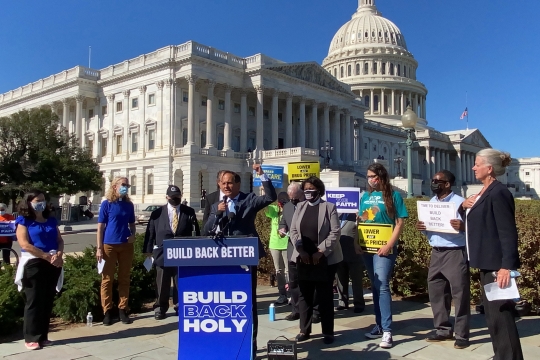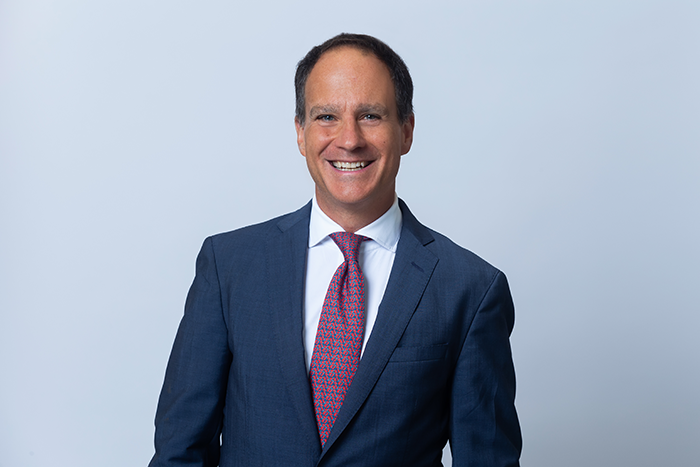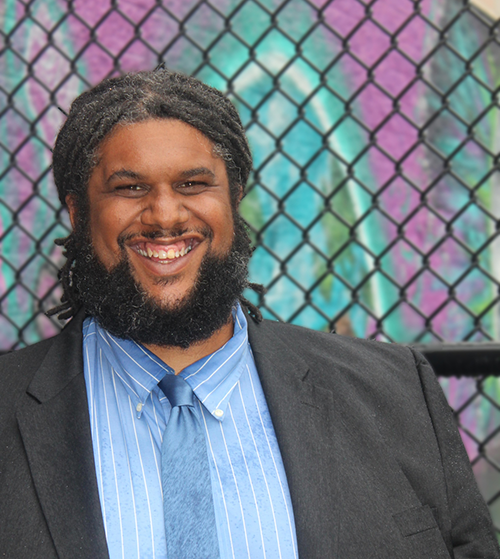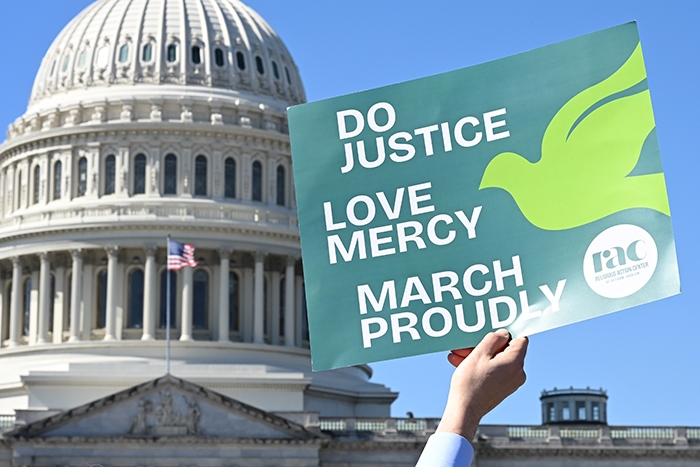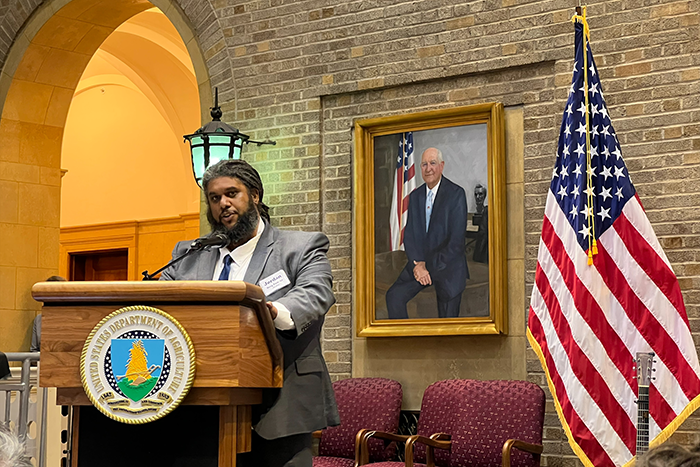
The following blog post is adapted from the invocation given by Rabbi Jonah Pesner, Director of the RAC, and remarks given by Jordan Berg-Powers, RAC Consultant, at the U.S. Department of Agriculture’s (USDA) Jewish American Heritage Month event celebrating Jewish contributions to agriculture and the fight against hunger in America.
Rabbi Jonah Pesner
Eloheinu Velohei
Imoteinu Vavoteinu
God of our Mothers and our Fathers
God who formed the earth
And all of creation as a glorious
and sustainable ecosystem
With natural abundance to feed humanity
And all the creatures;
And who called us to be its steward;
God who inspired Sarah and Abraham
to open their tent
and welcome the strangers
with food, water, and sustenance;
God who provided the miracle of manna
even as we rose up from slavery
and journeyed through the wilderness.
And God who demanded
that we remember our own enslavement
And in radical empathy LOVE the stranger
Because we ourselves suffered.
God who calls us to center
the most vulnerable
the widow and the orphan;
to open our hands to the needy
Who inspires us at the seder table
To raise the Matzah and proclaim:
This is the bread of affliction
Let all who are hungry come and eat!
God who demands
that we make real that proclamation
By leaving the corners of our fields
for the hungry and needy among us.
God who was with Naomi and Ruth
in their time of suffering and hunger,
But whose covenantal requirement
of our people
Brought them sustenance in their gleanings….
God be with us now.
For despite the incredible abundance
of your creation,
Your children are starving.
You are the God
of the 34 million Americans
who are hungry.
You are the God
of the 9 million American children
who will go to bed hungry.
And wake up hungry.
So be with us Oh God.
On the occasion of
Jewish Heritage Month
Here at the United States
Department of Agriculture;
On this 41st day
of the counting of the Omer;
The sacred counting,
connecting the ancient
wheat and barley harvests
Connecting freedom from slavery
and revelation of the covenant
We also count the number of our neighbors
living with food insecurity
and the number of people
who rely on SNAP.
So even as we express our gratitude
to you O God,
We ask that you hold us accountable
To the covenant we made with you at Sinai
In which you declared:
“For There will never cease
to be people in need
In your land
Which is why I command you
To open your hand to all those
In poverty and in need
In your land.”
We hear your call
and we are grateful;
grateful for the abundance
You provide
And the sacred responsibility
To share the bounty.
Baruch Atah Adonai
Eloheinu Melech Haolam
Hazan et Ha-olam kulo betuvo
B’chen b’chesed u’verachamim
Hu notein lechem l’chol basar
Ki L’olam chasdo
Blessed are you O God,
Sovereign of all of creation
In your goodness
You have supplied enough sustenance
to feed the entire world
In your unending grace,
love and compassion
You have ensured
that there is enough bread
To feed every creature
Baruch Atah Adonai,
Hazan et hakol
Blessed are You
Who provides sustenance for all –
Now let us do our part!
Amen
Jordan Berg-Powers
My first plane ride by myself was to Atlanta where my Grandparents of Blessed Memory picked me up and drove me to their home in Tuskegee Alabama. Once you get out of the Atlanta suburbs you see a lot of rural Georgia and Alabama. Amongst the trees and vast farmland was my history. As my family oral history goes, my grandfather’s great great grandfather escaped from these fields on his way to freedom in the North. Inheriting that legacy my Grandfather was a Civil Rights leader, Doctor and at that time professor at the historic Black College Tuskegee University, Dr. Ted Childs was proud to introduce me, his grandson to the land and the history and to one of the town's most important stewards of that land, George Washington Carver the inventor and scientist whose greatest work was improving farming.
Like Jewish people, people have an image in mind when you say farmers. But just like Jewish people, farmers span the beautiful array of the human family. George Washington Carver is one of many once nearly invisible and too often forgotten long legacy of Black farmers. I am thankful for the organizing of these forebears and through the USDA in working to undo past historical harm and see the rich history of Black farmers. As we, Jewish people are thankfully embarking on a similar journey fully integrating and unearthing the important contributions of Jews of Color.
In this previous Shabbat’s Torah portion, we actually get some great wisdom on these overlapping legacies. G-d instructs Moses to tell the Israelites that in every seventh year, the land shall observe a Sabbath of complete rest: the land rests, and we are not to prune the crops, or plant. Everyone eats what they need. After forty-nine years, a jubilee year is to be celebrated when all the land that had been sold during that time should be returned to its original owners and slaves are to be freed. We are some 3 jubilees past the beginning of Reconstruction, and the work continues to return the land and undo the legacies of bondage. To ensure that all who are hungry are fed.
George Washington Carver spoke to my grandfather not just as a scientist, although that was important, but as a dedicated advocate for the betterment of Black people in America. Following the failed promise of reconstruction Black farmers were stuck in sharecropping farms. Motivating Carver was a desire to move Black farmers out of our economic destitution and allow us to prosper through improved techniques. It’s that story my Grandfather passed on to me time and again as I visited him in Tuskegee.
I join you today proudly as a Board Member for JOIN for Justice - the National Jewish Organizing organization, many other local Massachusetts Jewish organizations. I also come to you as someone who works for the Religious Action Center of Reform Judaism, I am proud of the work the movement has done and we have done to dig into surfacing Jews of Color.
This Jewish Heritage Month I am struck by how empty the soul of our community is when we are deprived the nourishment of the rich history of all the Jewish people, and how much fuller we feel with joy, new perspective and delicious food when we expand our Jewish institutions to the beautiful full array of the Jewish experience.
As any Farmer of color can tell you and indeed any Jew of Color can tell you, our history and our existence is a rich story of tilling and tilling until the lands bursts with the fruit of our organizing.
What is harvested when Judaism sees me and the USDA fully sees their farmers of Color is dynamism, invention, new foods grown from the intersections of our lived experiences and community, the strength that comes from biodiversity.
This Jewish Heritage Month event at the USDA which I am honored to speak at feels like yet another step towards realizing this rich dream. Thank you all, and may we all continue to work together towards the day when no one is hungry because we fed all who came to eat, when everyone who was in need got what they needed. That we went from the narrow place to the promised land Amos called us toward where justice,and righteousness flow as a mighty stream.
Related Posts
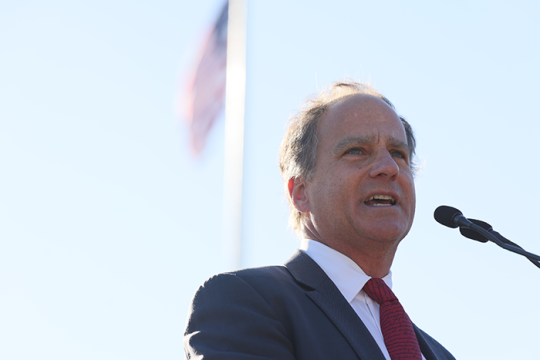
Rabbi Jonah Pesner Speaks at Voting Rights Rally Outside the U.S. Supreme Court
A Letter to the 118th Congress
